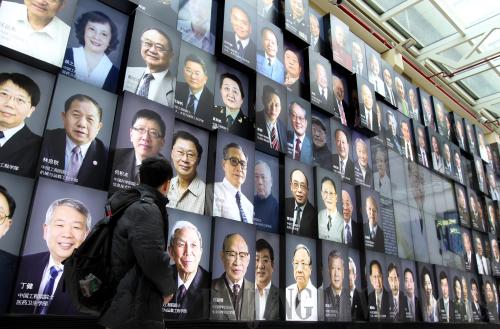|
 |
|
HOMETOWN PRIDE: A man walks past a multi-media demonstration showing Shanghai-based academicians of the Chinese Academy of Sciences and the Chinese Academy of Engineering in the Shanghai Science Hall on January 28 (LIU YING) |
Usually, the shorter list is made public in August when the candidates are narrowed down to around 150, but the CAS did not do so last year. There was speculation that this was due to attempts to lobby academicians for a ticket to the final round despite rules prohibiting this practice.
To reverse the situation, the amended charters of the CAS and the CAE limit nomination rights to incumbent academicians and academic groups, barring administrative departments from taking part.
Zhai Guangming, a CAE academician, said that he believes the move will reduce administrative influence in the selection process.
"In the past, we had to consider candidates we knew were underqualified because they were recommended by government departments that controlled many of the resources we need," Zhai said. "We often knew little about some of the candidates and their academic achievements, which created problems when we had to evaluate them."
Another complaint about the addition of academicians was the high percentage of government officials. For instance, in 2009, more than 85 percent of the 48 new CAE members were incumbent high-ranking officials or corporate executives.
"All officials eventually retire, but being an academician is a lifetime honor," said Gu Haibing, a professor at the School of Economics of Beijing-based Renmin University of China.
Lei Zhidong, an academician of the CAE, worried that for officials who are nominated for academician titles, it is difficult to tell whether their achievements should be credited to their team as a whole or their individual efforts.
Some reforms had been made to the academician selection process in response to this even before the CAS and the CAE amended their charters this year. For instance, of the 104 academicians elected to the two academies last year, only three were high-ranking government officials or corporate executives.
Meanwhile, the election of new academicians now requires a vote by the whole academy, rather than just one of its divisions.
Previously, candidates were divided into groups based on their professional fields preceding the vote in October. Each candidate faced a review committee composed of the three academicians who know the most about the candidates, usually including their referrer.
The new rule is considered by many as a step to further improve the quality of academicians. "It is a reference to international practices and will be helpful in strengthening the reviewing of candidates," said Xu Rigan, another CAE academician.
However, Gu thinks that the reform falls short.
"Due to the divisions between different academic subjects, it is impossible for an academician to understand every academic branch. So it is illogical to allow academicians to vote on candidates from other academic fields," Gu said.
Privileges
In 2003, Gu was commissioned by the government to study China's academician system. He found that academicians' powers over allocating research funding and evaluating research results could be abused, which would in turn result in ineffective use of research funds and academic corruption that would stifle innovation.
The lucrative incentives to hold the title have changed the nature of academicians' nominations, with many potential candidates attempting to fake research in order to win a place in the CAS or the CAE in order to profit from the title, according to Gu.
The real benefits, such as special privileges and better access to resources, have driven some local governments and academic institutions, especially those in less developed central and western provinces, to be more eager to have their scholars elected as academicians or attract academicians to work for them.
In 2009, the Academy of Science and Technology in southwest China's Chongqing publicly announced that any academician seeking a contract there would be given a 2-million-yuan ($321,400) allowance plus 200-square-meter housing, according to reports.
Gu suggests that academician should be an honorary title with no affiliated administrative and economic powers.
But Chu with the Shanghai Institute of Technical Physics doesn't think the preferential treatment is an attraction for academicians who truly want to pursue an academic career, and neither does he believe that this title gives them more advantages when competing for scientific funds.
Wang Enduo, a CAS academician and a researcher at the Shanghai Institute of Biochemistry and Cell Biology, agrees with Chu. He argued that the special treatment academicians are reported to enjoy is somewhat exaggerated.
"It's true that academicians are given VIP status when seeing doctors in public hospitals or taking flights, but that's it," Wang Enduo said.
Wang Enduo added that some academicians in her institute who are in their 70s still take the bus to work every day.
Chu and Wang Enduo both denied that academicians have greater access to scientific funds. Chu said that only half of academicians are able to get the grants they apply for. Wang Enduo mentioned that two projects that she applied for this year were rejected.
According to Chu, the income of an academician in China is normally made up of two parts—their wages and their special subsidies. The latter can sometimes be many times larger than the former, Chu added.
"In Shanghai, the subsidy for academicians is around 150,000-300,000 yuan ($24,075-48,150) each year. But compared to professors at the same level in overseas universities, this is not much at all, as their regular wages are high," Chu said.
| 